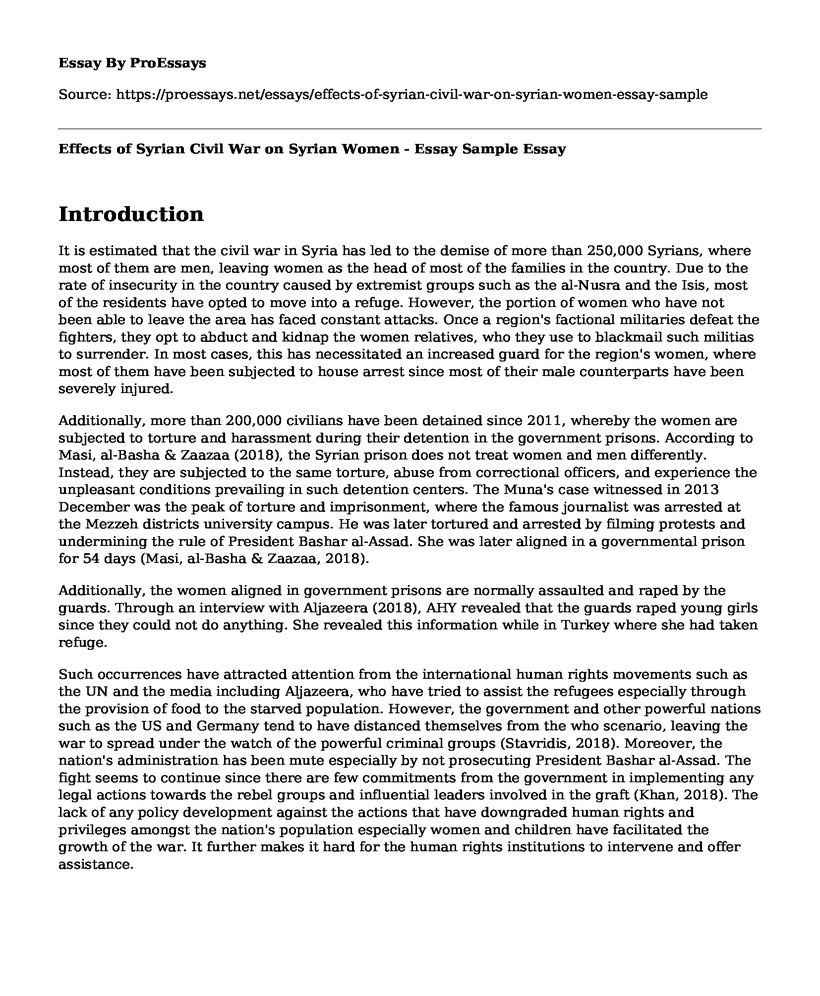Introduction
It is estimated that the civil war in Syria has led to the demise of more than 250,000 Syrians, where most of them are men, leaving women as the head of most of the families in the country. Due to the rate of insecurity in the country caused by extremist groups such as the al-Nusra and the Isis, most of the residents have opted to move into a refuge. However, the portion of women who have not been able to leave the area has faced constant attacks. Once a region's factional militaries defeat the fighters, they opt to abduct and kidnap the women relatives, who they use to blackmail such militias to surrender. In most cases, this has necessitated an increased guard for the region's women, where most of them have been subjected to house arrest since most of their male counterparts have been severely injured.
Additionally, more than 200,000 civilians have been detained since 2011, whereby the women are subjected to torture and harassment during their detention in the government prisons. According to Masi, al-Basha & Zaazaa (2018), the Syrian prison does not treat women and men differently. Instead, they are subjected to the same torture, abuse from correctional officers, and experience the unpleasant conditions prevailing in such detention centers. The Muna's case witnessed in 2013 December was the peak of torture and imprisonment, where the famous journalist was arrested at the Mezzeh districts university campus. He was later tortured and arrested by filming protests and undermining the rule of President Bashar al-Assad. She was later aligned in a governmental prison for 54 days (Masi, al-Basha & Zaazaa, 2018).
Additionally, the women aligned in government prisons are normally assaulted and raped by the guards. Through an interview with Aljazeera (2018), AHY revealed that the guards raped young girls since they could not do anything. She revealed this information while in Turkey where she had taken refuge.
Such occurrences have attracted attention from the international human rights movements such as the UN and the media including Aljazeera, who have tried to assist the refugees especially through the provision of food to the starved population. However, the government and other powerful nations such as the US and Germany tend to have distanced themselves from the who scenario, leaving the war to spread under the watch of the powerful criminal groups (Stavridis, 2018). Moreover, the nation's administration has been mute especially by not prosecuting President Bashar al-Assad. The fight seems to continue since there are few commitments from the government in implementing any legal actions towards the rebel groups and influential leaders involved in the graft (Khan, 2018). The lack of any policy development against the actions that have downgraded human rights and privileges amongst the nation's population especially women and children have facilitated the growth of the war. It further makes it hard for the human rights institutions to intervene and offer assistance.
Conclusion
The initial process to bring sanity to Syria will start with the strengthening of the government's stand and actions against the rebel forces, and also the prosecution of the individuals such as President Bashar al-Assad, who are behind the war. Secondly, the formulation of policies guarding human rights and even treaties to end the extended war. Given enough resources, the first effort would be creating awareness and involvement in peace initiatives such as assemblies to unite various groups (Belcastro, 2017). This would establish peace in the nation, and then later we would vouch for the formulation of women rights in the country.
References
Aljazeera. (2018). Syrian ex-prisoners recall rape, 417 girls still held. Aljazeera.com. Retrieved 19 April 2018, from https://www.aljazeera.com/news/2018/03/syrian-prisoners-recall-rape-417-girls-held-180310103008793.html.
Belcastro, F. (2017). From Domestic to Regional: The Civil War Conundrum and the Cases of Syria and Algeria. Civil Wars, 19(2), 198-219. http://dx.doi.org/10.1080/13698249.2017.1374670.
Khan, S. (2018). What is the World Doing to Stop Syria's Civil War? HuffPost. Retrieved 19 April 2018, from https://www.huffingtonpost.com/saad-khan/what-is-the-world-doing-to-stop-Syria's-civil-war_b_9189752.html
Masi, A., al-Basha, A., & Zaazaa, A. (2018). In Syria, Women Are Imprisoned by All Sides. Syria. Retrieved 19 April 2018, from https://www.newsdeeply.com/syria/articles/2017/10/04/in-syria-women-are-imprisoned-by-all-sides.
Stavridis, J. (2018). How the U.S. Can Help End the Syrian Civil War. Time. Retrieved 19 April 2018, from http://time.com/5195442/eastern-ghouta-syria-civil-war-anniversary/.
Cite this page
Effects of Syrian Civil War on Syrian Women - Essay Sample. (2022, May 16). Retrieved from https://proessays.net/essays/effects-of-syrian-civil-war-on-syrian-women-essay-sample
If you are the original author of this essay and no longer wish to have it published on the ProEssays website, please click below to request its removal:
- Case Analysis Essay: United States vs. Bailey
- Critical Infrastructure Vulnerability and Protection Essay
- Case Study: Slavery in Africa
- Traits of Frederick Douglass' Leadership Essay
- Paper Example on 19th Century America: Shift to Democracy & Industrialization
- Essay on Comparing Microeconomic Effects of the Great Depression and Current Economic Crisis
- Ida B. Wells-Barnett: Exposing The Reality of Lynch Law in America - Essay Sample







